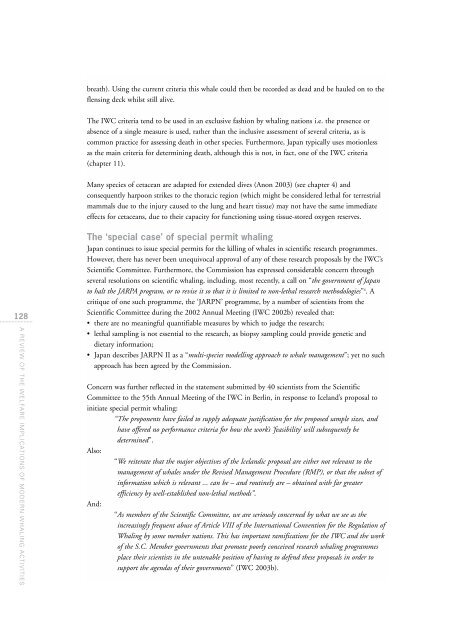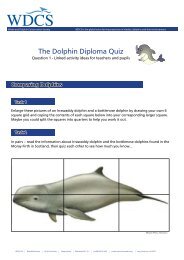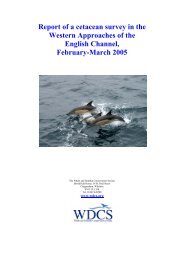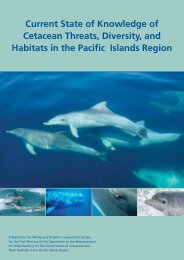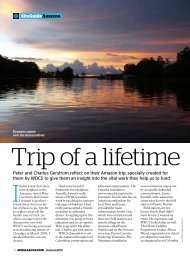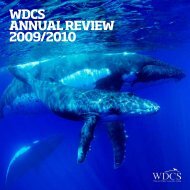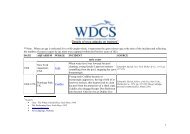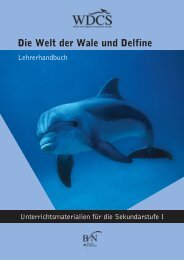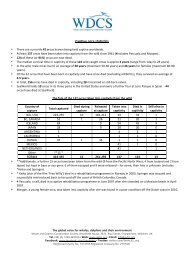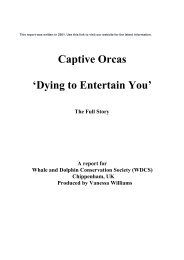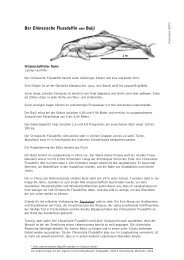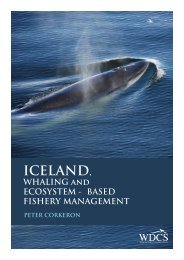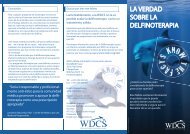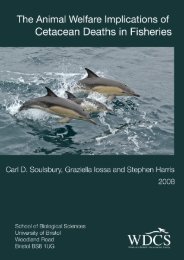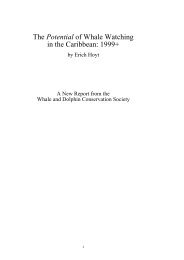TROUBLED WATERS - Whale and Dolphin Conservation Society
TROUBLED WATERS - Whale and Dolphin Conservation Society
TROUBLED WATERS - Whale and Dolphin Conservation Society
Create successful ePaper yourself
Turn your PDF publications into a flip-book with our unique Google optimized e-Paper software.
128<br />
A REVIEW OF THE WELFARE IMPLICATIONS OF MODERN WHALING ACTIVITIES<br />
breath). Using the current criteria this whale could then be recorded as dead <strong>and</strong> be hauled on to the<br />
flensing deck whilst still alive.<br />
The IWC criteria tend to be used in an exclusive fashion by whaling nations i.e. the presence or<br />
absence of a single measure is used, rather than the inclusive assessment of several criteria, as is<br />
common practice for assessing death in other species. Furthermore, Japan typically uses motionless<br />
as the main criteria for determining death, although this is not, in fact, one of the IWC criteria<br />
(chapter 11).<br />
Many species of cetacean are adapted for extended dives (Anon 2003) (see chapter 4) <strong>and</strong><br />
consequently harpoon strikes to the thoracic region (which might be considered lethal for terrestrial<br />
mammals due to the injury caused to the lung <strong>and</strong> heart tissue) may not have the same immediate<br />
effects for cetaceans, due to their capacity for functioning using tissue-stored oxygen reserves.<br />
The ‘special case’ of special permit whaling<br />
Japan continues to issue special permits for the killing of whales in scientific research programmes.<br />
However, there has never been unequivocal approval of any of these research proposals by the IWC’s<br />
Scientific Committee. Furthermore, the Commission has expressed considerable concern through<br />
several resolutions on scientific whaling, including, most recently, a call on “the government of Japan<br />
to halt the JARPA program, or to revise it so that it is limited to non-lethal research methodologies” 4 . A<br />
critique of one such programme, the ‘JARPN’ programme, by a number of scientists from the<br />
Scientific Committee during the 2002 Annual Meeting (IWC 2002b) revealed that:<br />
• there are no meaningful quantifiable measures by which to judge the research;<br />
• lethal sampling is not essential to the research, as biopsy sampling could provide genetic <strong>and</strong><br />
dietary information;<br />
• Japan describes JARPN II as a “multi-species modelling approach to whale management”; yet no such<br />
approach has been agreed by the Commission.<br />
Concern was further reflected in the statement submitted by 40 scientists from the Scientific<br />
Committee to the 55th Annual Meeting of the IWC in Berlin, in response to Icel<strong>and</strong>’s proposal to<br />
initiate special permit whaling:<br />
“The proponents have failed to supply adequate justification for the proposed sample sizes, <strong>and</strong><br />
have offered no performance criteria for how the work’s ‘feasibility’ will subsequently be<br />
determined”.<br />
Also:<br />
“We reiterate that the major objectives of the Icel<strong>and</strong>ic proposal are either not relevant to the<br />
management of whales under the Revised Management Procedure (RMP), or that the subset of<br />
information which is relevant ... can be – <strong>and</strong> routinely are – obtained with far greater<br />
efficiency by well-established non-lethal methods”.<br />
And:<br />
“As members of the Scientific Committee, we are seriously concerned by what we see as the<br />
increasingly frequent abuse of Article VIII of the International Convention for the Regulation of<br />
Whaling by some member nations. This has important ramifications for the IWC <strong>and</strong> the work<br />
of the S.C. Member governments that promote poorly conceived research whaling programmes<br />
place their scientists in the untenable position of having to defend these proposals in order to<br />
support the agendas of their governments” (IWC 2003b).


